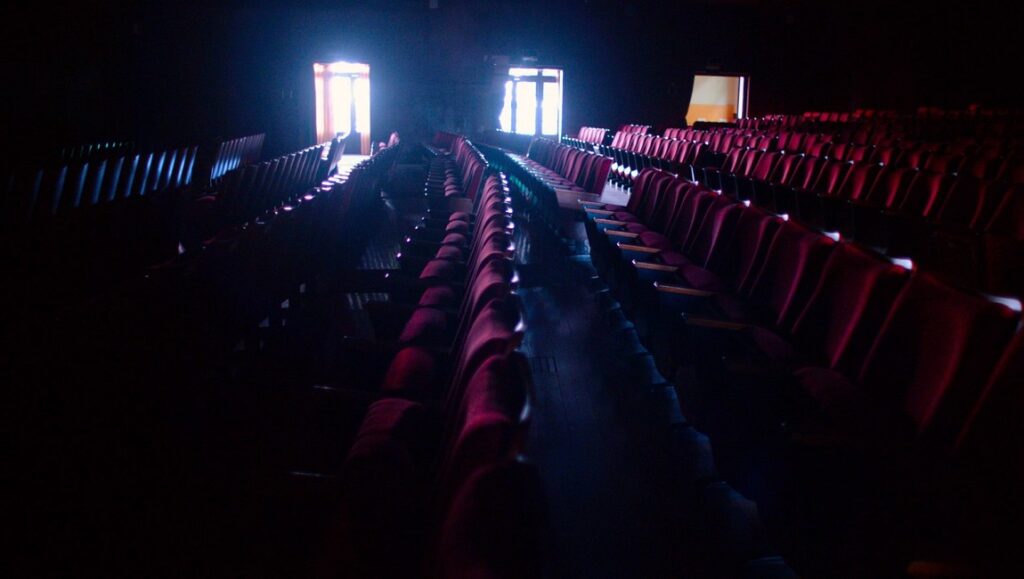There’s a willful naivete many cinephiles employ when attempting to wax poetics about “the theater-going experience,” one that blatantly ignores sociopolitical and economic dimensions in favor of embracing the notion that because one has the financial means to A). reside in a city that provides you access to pleasantries like a movie theater and B). afford the price of admission, which is upwards of $20 depending on where one lives, that it somehow adds a certain value to whatever work one is viewing. One could argue that seeing something on a big screen in a dark room is how many makers—mainly the Robert Beavers of the world, who continue to work exclusively with the archaic model of analog film—prefer audiences experience their work; they’re obviously in favor of this because it continues to allow them to tour the country and make a living off of rentals and live appearances. A cottage industry of sorts has emerged from this notion, wherein the limited audience exposure and calculated rarity increases the value of the work, while also making it so these makers don’t have to worry about anyone leaking something as cumbersome as a film print online (this ignores the use of cam rips, but I digress). You get the usual trotted-out arguments for keeping this obsolete model in place: cinema is a communal experience with strangers (not really, but OK), that it provides a social aspect to cinephilia (again, not really, as you sit there silently for two hours), and, maybe the only rock-solid argument here, it helps to provide employment to thousands of workers across the country.
So while his objective may be to examine such a significant location emptied of all movement, bathed in light and implicit in its history (both personal and otherwise), the result is a film that creates friction within its more pressing contemporary situation—one that rather foolishly believes art can ever be apolitical.
So when Tsai Ming-liang decides to showcase Zhongshan Hall—a historic building where Taiwan’s Golden Horse Awards are held each year—in his 2019 short Light, and makes the conscious decision to exclude anyone who works at the location, he’s essentially erasing much of the venue’s humanity. The workers who keep this hall running, who clean it, fix any damages that may occur over time, and who project the films, are the lifeblood of any theater. Yet, this is hardly the illustrious occupation one would associate with such a beloved building: they’re paid minimum wage, have no benefits or healthcare, and have to clean up some really disgusting shit whenever someone spills their extra-large Diet Coke all over the seats. But because they represent something discomforting about the theater experience—that it operates under the strict guidelines of late capitalism and requires unskilled labor at a cheap price—it’s more convenient for theater-goers to ignore them. And since Tsai is convinced of the theater as the “pure” cinematic experience, he figures cutting them out will only make it that much more genuine. To be fair to the director, it seems safe to assume that it is not his intention to rid the venue of its economic and labor context, as his affection for Zhongshan Hall has some openheartedness relating to its personal and political context: it’s in this building where Tsai first volunteered as a ticket seller to see films for free, where he eventually opened a small coffee shop and would occasionally screen older works with a small cinema club; more importantly, this is also where the Japanese Instrument of Surrender was officially signed and officiated. So while his objective may be to examine such a significant location emptied of all movement, bathed in light and implicit in its history (both personal and otherwise), the result is a film that creates friction within its more pressing contemporary situation—one that rather foolishly believes art can ever be apolitical.
Tsai said of Light: “I switched off all the lights and allowed the warm winter sun to shine on her face.” He addresses the theater by using the female pronoun of “her,” acknowledging the very human spirit and foundation of the location, but it remains only romantic suggestion from such a humanist director. So how does Tsai choose to exhibit this massive location if he’s not concerned with anything other than some Benjaminian notion of aura? By utilizing modern digital technologies to parrot a Dorsky-esque use of montage that really only works on an intimate level when projected at 18 FPS; an antiquated mode used to celebrate an outdated business model. What’s left is a film that fails on multiple fronts: in attempting to reckon with the moving image outside of the realm of capital, in acknowledging the autonomy of laborers working within a broken economic system, and in utilizing the medium of digital photography to its full potential. Instead, Light is satisfied to lay an indexical claim, comfortable in its ignorance of context, that celluloid could have just as easily accomplished.


Comments are closed.